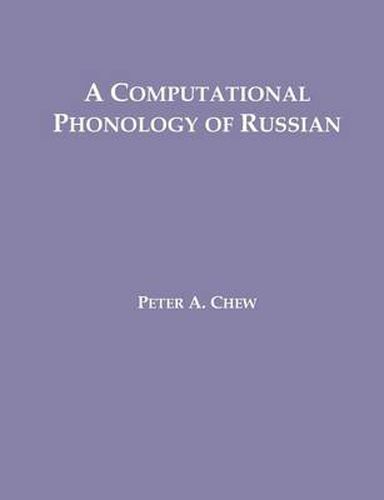Readings Newsletter
Become a Readings Member to make your shopping experience even easier.
Sign in or sign up for free!
You’re not far away from qualifying for FREE standard shipping within Australia
You’ve qualified for FREE standard shipping within Australia
The cart is loading…






This title is printed to order. This book may have been self-published. If so, we cannot guarantee the quality of the content. In the main most books will have gone through the editing process however some may not. We therefore suggest that you be aware of this before ordering this book. If in doubt check either the author or publisher’s details as we are unable to accept any returns unless they are faulty. Please contact us if you have any questions.
This dissertation provides a coherent, synchronic, broad-coverage, generative phonology of Russian. I test the grammar empirically in a number of ways to determine its goodness of fit to Russian. In taking this approach, I aim to avoid making untested (or even incoherent) generalizations based on only a handful of examples. In most cases, the tests show that there are exceptions to the theory, but at least we know what the exceptions are, a baseline is set against which future theories can be measured, and in most cases the percentage of exceptional cases is reduced to below 5%. The principal theoretical outcomes of the work are as follows. First, I show that all of the phonological or morphophonological processes reviewed can be described by a grammar no more powerful than context-free. Secondly, I exploit probabilistic constraints in the syllable structure grammar to explain why constraints on word-marginal onsets and codas are weaker than on word-internal onsets and codas. I argue that the features []/- initial] and []/- final], and extraprosodicity, are unnecessary for this purpose.
$9.00 standard shipping within Australia
FREE standard shipping within Australia for orders over $100.00
Express & International shipping calculated at checkout
This title is printed to order. This book may have been self-published. If so, we cannot guarantee the quality of the content. In the main most books will have gone through the editing process however some may not. We therefore suggest that you be aware of this before ordering this book. If in doubt check either the author or publisher’s details as we are unable to accept any returns unless they are faulty. Please contact us if you have any questions.
This dissertation provides a coherent, synchronic, broad-coverage, generative phonology of Russian. I test the grammar empirically in a number of ways to determine its goodness of fit to Russian. In taking this approach, I aim to avoid making untested (or even incoherent) generalizations based on only a handful of examples. In most cases, the tests show that there are exceptions to the theory, but at least we know what the exceptions are, a baseline is set against which future theories can be measured, and in most cases the percentage of exceptional cases is reduced to below 5%. The principal theoretical outcomes of the work are as follows. First, I show that all of the phonological or morphophonological processes reviewed can be described by a grammar no more powerful than context-free. Secondly, I exploit probabilistic constraints in the syllable structure grammar to explain why constraints on word-marginal onsets and codas are weaker than on word-internal onsets and codas. I argue that the features []/- initial] and []/- final], and extraprosodicity, are unnecessary for this purpose.